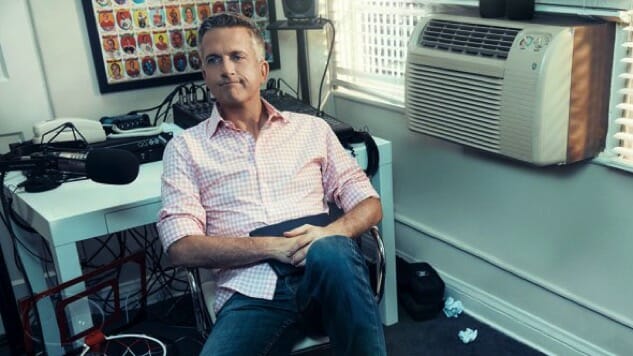If you have a reason to care about such things, the ongoing war of words between Bill Simmons and his former employer ESPN has been a fascinating thing to witness. On one side, you have a deposed writer and on-air personality who claims that he was shown the door because of his unfiltered comments about Roger Goodell, commissioner of the NFL, and his handling of the Ray Rice debacle. On the other other, you have a brand whose president John Skipper told the New York Times that they booted Simmons for “his repeated lack of respect for this company and, more importantly, the people who work here.”
Both sides are right. A media personality talked out of turn knowing he was going to ruffle feathers and make headlines, and his employers responding in kind, if a little petulantly. But the most important thing is that Simmons was aware of both consequences and potential benefits of his actions. Just a few weeks after his departure from “The Worldwide Leader In Sports” was made public, he came striding out like a grinning new parent with a lucrative, multi-platform partnership with HBO cradled in his arms.
I’m one of the suckers who had high hopes for this arrangement. I knew how much Simmons was working the angles to keep himself and his brand in the public eye, yet, I was also a fan of his writing, his hiring of other smart scribes and thinkers over at Grantland (and now The Ringer), and, admittedly, his love of the Boston Red Sox. So, I take little pleasure in joining the chorus of voices who are proclaiming Any Given Wednesday, his first TV foray with his new employer, an absolute dud.
The original sin with AGW is that Simmons somehow believed that he could just take the things that made him famous—his writing and his podcast—and translate it into TV form without any consideration of the format’s needs or voice. The four episodes he has produced to date have only proven how foolhardy that thinking was.
His rants about the current sports landscape that open and close every show were clearly not conceived with a TV audience in mind. Even with the splashy visuals and clips threaded into each one, they still sound like he’s reading edited excerpts from his blog with stilted wordplay and the spoken equivalent of those floating footnotes that accompanied every Grantland piece. His interviews, too, seem built more for podcast subscribers rather than folks paying for HBO. They’re as casual as Simmons’ on-air wardrobe, wandering down discursive pathways and stopping to admire their own brilliance.
The three-way chat between Simmons, writer Malcolm Gladwell, and bajillionaire Mark Cuban was 10 minutes of cross-talk and bonhomie with almost zero substance, other than reminding us about the egregious amounts of money that the NBA owners have at their disposal. His buddy Ben Affleck arrived on the debut episode to fume about Deflategate and how “classy” Tom Brady is. His most recent interview featured Packers QB Aaron Rodgers to get lobbed a bunch of softball questions about his favorite Sacramento Kings players for seven minutes, before finally asking him about concussions. Simmons seems to be evoking Mr. Show character Grass Valley Greg, encouraging all involved to hang out and do whatever.
There’s also a fundamental misunderstanding in how to make the subject matter at hand compelling to even non-fans or non-sports enthusiasts. Simmons is capable of such, as his cogent discussion of Serena Williams’ greatness proved in the latest episode. But jump back two episodes to his discussion of the billion-dollar industry that is UFC. His buildup to a sweaty, insider-y interview with Joe Rogan landed with a wet thud.
Perhaps the most baffling thing is that Simmons is being allowed to figure all this out in real time with the larded coffers of HBO at his disposal. On a recent episode of his podcast, he said, “I think we have the bones of something I really like… we’ll know by episode 10 what the format is for good. Right now we’re going to try some things.”
Compare that to the experience of Issa Rae, the creator of the popular web series Awkward Black Girl. She signed a deal to produce a show for HBO back in 2013, only to run through a gauntlet of development bullshit to finally get her series Insecure on the air this fall. Granted, Simmons was more of a known quantity by the time he signed with a new cable giant, but he’s got quite a long leash on him and doesn’t have the ratings or prestige to show for it. In fact, if Showbuzz Daily is to be believed, the last episode of Vinyl scored better viewership than he did, and it was just cut from the roster. And Simmons still has 16 more weeks of shows to “try some things.”
If Simmons has the lack of respect for anyone, it’s for his fans. His untucked shirts and half-assed attitude intends to signal that AGW is the exact opposite of the suit and tie brigade over in Bristol. Instead, it comes off like Simmons is only giving 25% of his attention and energy to the show, so he has an excuse when the plug inevitably gets pulled on this venture. (“It doesn’t really matter that it got canceled. I wasn’t really giving it my all anyway.”) He has the bones of a good-to-great TV show here, but shows little interest in fitting them with muscle and organs or anything to give this solidity and longevity.
Robert Ham is a regular contributor to Paste
and the author of Empire: The Unauthorized Untold Story, out now via Regan Arts. Follow him on Twitter.